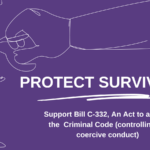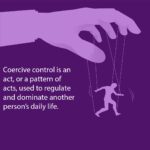
Coercive Control Bill Moves to Committee
The evening of February 7, 2024, Bill C-332, An Act to amend the Criminal Code (controlling or coercive conduct), was read
Domestic abuse is more than physical and sexual abuse. It can be simple things that make you feel unsafe, like constantly calling, texting to find out your location and undermining your relationships with friends and family.
These tactics are all forms of coercive control – a pattern of behaviour used to regulate and dominate another person’s daily life.

It is all the ways in which a person may be made to feel unsteady. Coercive control taps away at a person’s sense of self and their support system to isolate and trap them.

It is often unseen from the surface.

It traps a person inside a cage of coercion and control. It keeps a person isolated and alone.
Coercive control can take many forms. The tactics can change from relationship to relationship and day-to-day. Texting a partner to ask where they are could be a normal part of coordinating schedules, or it could be part of an ongoing effort to monitor a partner’s location. A pattern of behaviour used to regulate and dominate another person’s daily life is coercive control. Here are some examples of what coercive control could look like:
These are just a few of the potential tactics used in coercive control. The examples are limitless. Any pattern of behaviour that is intended to control or instil fear in another person’s daily life can be considered coercive control.

Before going to Sagesse, calling the police, or accessing a shelter, most people talk to their friends, family, neighbours, doctors, lawyers, teachers, and colleagues. People they trust and already have a relationship with.
Coercive control is subtle. It’s about recognizing a pattern of behaviors that doesn’t seem right, people acting different than usual, or afraid or fearful. Recognizing abuse is about checking in on our assumptions about people and their relationships, and being willing to engage when something feels off.

1 in 3 Albertans will experience domestic abuse in their lifetime. REAL Talk is a guide to help us understand and talk openly about domestic abuse. Learn to break the cycle of domestic abuse with just a few words.

The evening of February 7, 2024, Bill C-332, An Act to amend the Criminal Code (controlling or coercive conduct), was read

On February 7, 2024, Bill C-332, An Act to amend the Criminal Code (controlling or coercive conduct), is projected to continue

Advocate for Bill C-332 and help expand protections for people in abusive relationships It’s a type of abuse experienced in

Justice Minister: Offence Targeting Coercive Control Aligned with Government Efforts On August 14, the Honourable Arif Virani, Minister of Justice